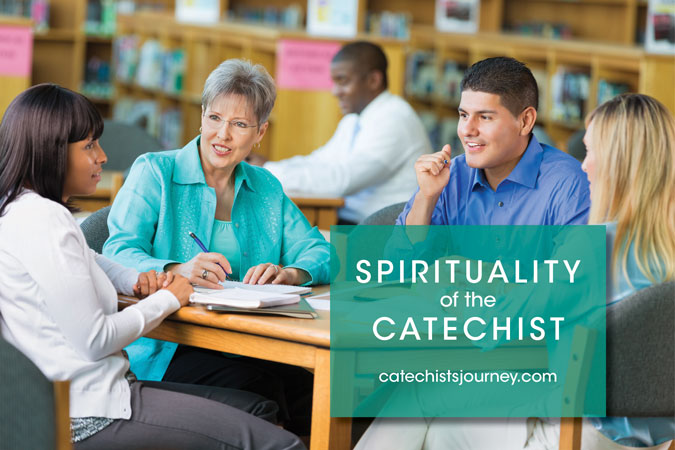
This reflection is part of the Spirituality of the Catechist Online Retreat.
Some of the greatest years of my life have been spent catechizing in parochial religious education programs and teaching theology at a Catholic college preparatory school in the Diocese of Birmingham. In my teaching, I have always strived to pass on the Deposit of Faith by being an authentic witness of the saving power of God.
Catechists possess an awesome responsibility to carry out Christ’s command to “Go therefore and make disciples of all nations.” (Matthew 28:19) Catechists have a distinct privilege and responsibility to hand on the faith to the next generation, a process that involves partnerships between families and the faith community. Through the Sacraments of Initiation—Baptism, Confirmation, and Eucharist—we “are born anew by Baptism, strengthened by the sacrament of Confirmation and receive in the Eucharist the food of eternal life.” (CCC 1212)
Young people in particular need to see in a very concrete way that their participation in the sacraments is genuinely important to all of us. The Sacraments of Initiation are catalysts of unity. Illustrated by our Lord’s words and deeds in the Gospel and the early Church’s reflection on the mission, our faith in Jesus Christ is not as much about us as individuals as it is about us as a loving family. Christ remains truly present in our world today through the Church. The work of catechists “is never an individual or isolated act, but is always deeply ecclesial” (Guide for Catechists #7). Our participation in the sacramental life of the Church unites us to Christ. Therefore, as living and active members of the Church, we must always illustrate and express the familial bond we share in faith.
We are tasked with reminding our communities that we all sit around the Eucharistic table without regard to the distinctions of nationality, ethnicity, age, gender, or whatever labels society uses to divide us. Catechists are called to provide connectedness, communion, spiritual commitment, and support to all people, regardless of their stations in life. We are called to show faithfully how sacramental life is something permanent and lasting, something long term. Through our work on behalf of Christ and the Church, we are called to exhibit the authenticity of our service, something that is truly internal and not merely on the surface. In union with the Church, Christ impels us to help the faithful to participate more actively in our covenant relationship with God, who seeks to give us life in its fullness.
In developing an openness to the Church, catechists should be nourished by the sacraments, which provide the power and strength to exercise true justice, true harmony, true righteousness, and true integrity in love. Catechists must continue to be challenged to live up to the Gospel values fully and completely. Catechists must allow the Gospel to speak its words directly and pointedly in our lives like the two-edged sword that it has always been (see Psalm 149:6). In these ways people will see us as exemplars of Christ the teacher.
This reflection was inspired by our retreat theme this week: An Openness to the Church. Read Joe Paprocki’s post introducing the theme and reflect with questions and spiritual exercises.
Because every faith community is unique in organization, culture, and tradition, God’s Gift: Reconciliation and Eucharist is built with flexibility to meet your distinct program needs. The God’s Gift series includes a variety of implementation models—so adaptation is simple.


The Eucharist is what makes us strong and unite as one with our Lord Jesus.
Young people need to see the catechist involved in the Parish and especially worshipping in the Eucharistic Celebration.
My understanding is that in the military it is considered to be bad form for an officer to engage in any sort of undignified behavior while in uniform. In other words, if you’re going to attend a bachelor or bachelorette party, leave your uniform in the closet. You might say the same thing about catechists, except that we always are in uniform. We need to live by Jesus’ example both inside and outside the church walls.